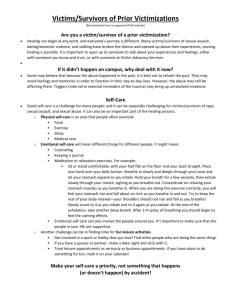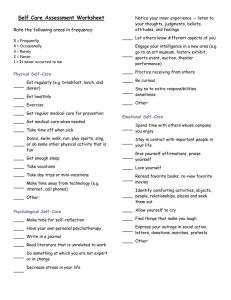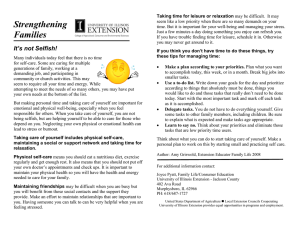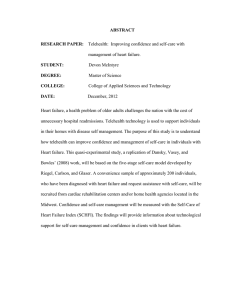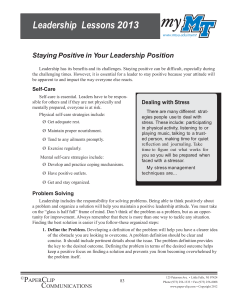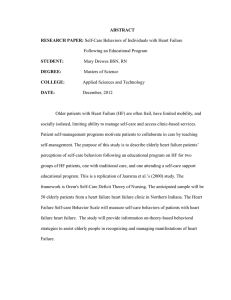So What Is “Self Care”? Self care includes any intentional actions
advertisement
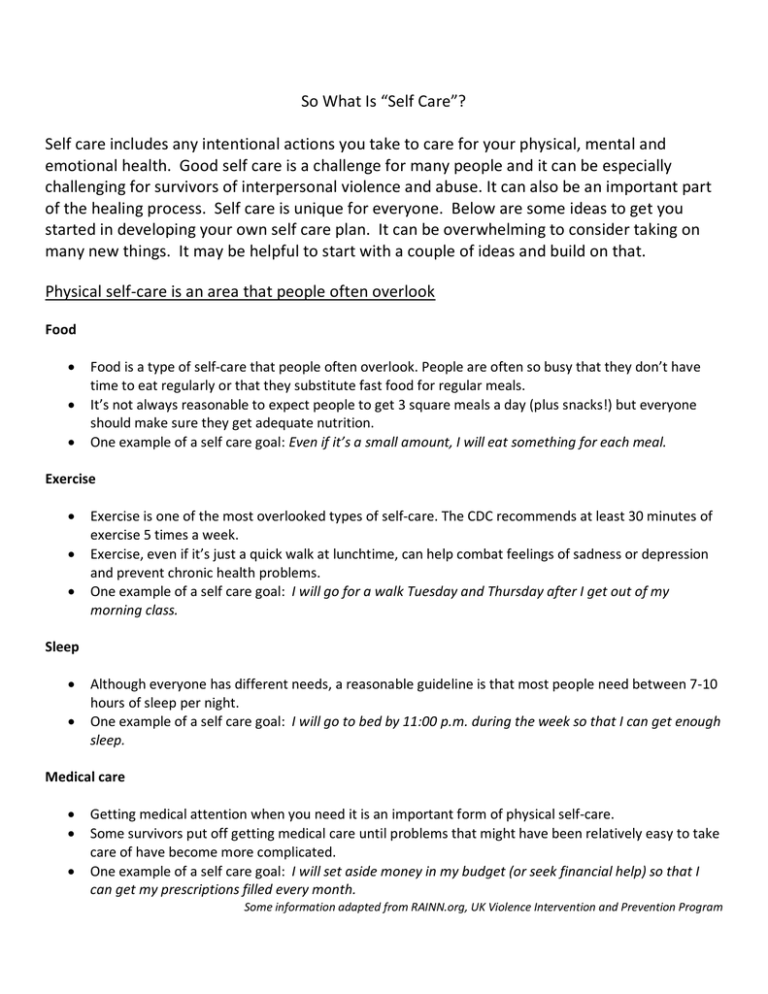
So What Is “Self Care”? Self care includes any intentional actions you take to care for your physical, mental and emotional health. Good self care is a challenge for many people and it can be especially challenging for survivors of interpersonal violence and abuse. It can also be an important part of the healing process. Self care is unique for everyone. Below are some ideas to get you started in developing your own self care plan. It can be overwhelming to consider taking on many new things. It may be helpful to start with a couple of ideas and build on that. Physical self-care is an area that people often overlook Food • • • Food is a type of self-care that people often overlook. People are often so busy that they don’t have time to eat regularly or that they substitute fast food for regular meals. It’s not always reasonable to expect people to get 3 square meals a day (plus snacks!) but everyone should make sure they get adequate nutrition. One example of a self care goal: Even if it’s a small amount, I will eat something for each meal. Exercise • • • Exercise is one of the most overlooked types of self-care. The CDC recommends at least 30 minutes of exercise 5 times a week. Exercise, even if it’s just a quick walk at lunchtime, can help combat feelings of sadness or depression and prevent chronic health problems. One example of a self care goal: I will go for a walk Tuesday and Thursday after I get out of my morning class. Sleep • • Although everyone has different needs, a reasonable guideline is that most people need between 7-10 hours of sleep per night. One example of a self care goal: I will go to bed by 11:00 p.m. during the week so that I can get enough sleep. Medical care • • • Getting medical attention when you need it is an important form of physical self-care. Some survivors put off getting medical care until problems that might have been relatively easy to take care of have become more complicated. One example of a self care goal: I will set aside money in my budget (or seek financial help) so that I can get my prescriptions filled every month. Some information adapted from RAINN.org, UK Violence Intervention and Prevention Program Emotional self-care will mean different things for different people. It might mean: Counseling • • • • This could mean seeing a psychologist, a clinical social worker, or therapist. The VIP Center can help refer you to a counselor. The UK Counseling Center provides free services to UK students. One example of a self care goal: I will find out more about the UK Counseling Center so that I can decide whether this might be helpful for me. Keeping a journal • Some survivors find that recording their thoughts and feelings in a journal or diary helps them manage their emotions after an assault or abusive situation. • One example of a self care goal: I will write in my journal at least 3 times this week. Meditation or relaxation exercises • Relaxation techniques or meditation help many survivors with their emotional self-care. For example: Sit or stand comfortably, with your feet flat on the floor and your back straight. Place one hand over your belly button. Breathe in slowly and deeply through your nose and let your stomach expand as you inhale. Hold your breath for a few seconds, then exhale slowly through your mouth, sighing as you breathe out. Concentrate on relaxing your stomach muscles as you breathe in. When you are doing this exercise correctly, you will feel your stomach rise and fall about an inch as you breathe in and out. Try to keep the rest of your body relaxed—your shoulders should not rise and fall as you breathe! Slowly count to 4 as you inhale and to 4 again as you exhale. At the end of the exhalation, take another deep breath. After 3-4 cycles of breathing you should begin to feel the calming effects. • One example of a self care goal: I will practice deep breathing before I go to sleep to calm down from the day. Emotional self-care can also involve the people around you. It’s important to make sure that the people in your life are supportive • Nurture relationships with people that make you feel good about yourself! • Make spending time with friends and family a priority • If you have trouble finding people who can support your experience as a survivor, consider joining a support group for survivors or getting involved with the VIP Center Be wary of… • Friends or family who only call when they need something • People who always leave you feeling tired or depressed when you see them • Friends who never have the time to listen to you Some information adapted from RAINN.org, UK Violence Intervention and Prevention Program • Anyone who dismisses or belittles your experience as a survivor You can deal with these people by setting limits. • You don’t have to cut them out of your life (especially with family, that may not even be an option!) but choose the time you will spend with them carefully. • Make sure that your time with these people has a clear end. • Cut back on the time you spend with people who don’t make you feel good, or spend time with them in a group rather than one-on-one. Screen your calls!! • There’s no rule that says you have to answer your phone every time it rings. If you don’t feel like talking on the phone, call people back at a time that’s more convenient for you. You can deal with these people by letting some go. • • If there are people in your life who consistently make you feel bad about yourself, consider letting those friendships or relationships go. This can be a difficult decision. Remember that you deserve to have people around you who genuinely care about you and who support you. Another challenge can be in finding time for fun leisure activities Many of us have full time jobs, go to school, volunteer and have families. Finding time to do activities that you enjoy is an important aspect of self-care. Be aware of things you may be doing that take up a lot of your time but don’t support your self care such as too much time on the internet, watching TV, even sleeping. These can all be relaxing, enjoyable activities in moderation but can become a way of retreating and isolating yourself. Get involved in a sport or hobby that you love!! Find other people who are doing the same thing! Knowing that people are counting on you to show up can help motivate you. Make a date night and stick with it, either with a partner, a friend or a group of friends. Turn off your cell phones (within reason. If the babysitter needs to be able to find you, consider leaving him/her the number of the restaurant so that you can turn off your ringer!) Treat leisure appointments as seriously as business appointments. If you have plans to do something for fun, mark it on your calendar! Make your self-care a priority, not something that happens (or doesn’t happen!) by accident. Some information adapted from RAINN.org, UK Violence Intervention and Prevention Program
